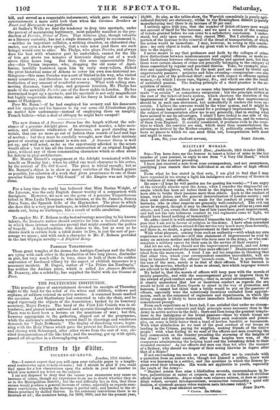trtttro to flit
TICKETS-OP-LEAVE. London, 171h October.
Sin—I cannot expect that you will open your valuable pages to a length- ened controversy upon tickets-of-leave; but I should be glad if you could find space for a few observations upon the article in your last number in which you noticed my letter on the subject.
I am not disposed to deny that the causes you enumerate may cause an increase of crime, though my experience leads me to doubt whether they do so in the Metropolitan district ; but the real difficulty lies in this, that these causes would produce a general increase of crime, especially as regards sum- mary convictions, whereas the increase is partial only, and limited to the of- fences practised by skilled thieves. In the summary convictions there is no increase at all ; the numbers being, for 1853, 9869, and for the present year,
10,009. So also, as the tables show, the WarwiCk committals (a purely agri- cultural district) are stationary, wlinat in the Birmingham district (apnrely manufacturing one) there is an increase of 35 per cent.
I entirely agree with you, that the number of ticket-of-leave-men would not account of itself for the increase ; and we need a return of the number of tickets granted before we can come to a satisfactory conclusion. I under- stand, but only upon rumour, they exceed 2000. But I attribute a great portion of the increase to the removal of the dread of transportation, of which the action would be immediate. I may, however, be wrong in this conclu- sion: my only object is truth, and my great wish to direct the public atten- tion to the inquiry. I never meant to say that professors sent forth by the colleges of crime drew distinctions between misdemeanours and capital offences, or made re- fined limitations between offences against females and against men, but that there were certain classes of crime not generally belonging to the category of those committed by regular and practised thieves. Take, for example, mur- ders and manslaughters, which for the most part are caused by brutal and ungovernable passions : perjuries and false swearing—conspiracies—are also out of the pale of the professed thief; and so with respect to offences against women,—by which I mean rape, bigamy, &c., and which are also the result of unbridled passion. The leading principle of a thief-practice is the ac- quisition of money. I agree with you that there is no reason why imprisonment should not be made "as certain" as compulsory emigration : but the principle strikes at the root of the ticket-of-leave system, which shortens the duration of the imprisonment if the conduct be .good. It may be right that imprisonment should be in such ease shortened, but undoubtedly it renders the term un- certain. I believe the converse would be the wiser system, and it might be useful to make bad conduct a ground for a prolonged imprisonment. Upon the subject of transportation allow me to say generally, that in stating what have seemed to me its advantages, I admit I have looked to one side of the question only, namely, its effect upon criminals themselves, and its removal of them from England : if, socially considered, it produces evils to the coon- tries to which the convicts are sent, which more than counterbalance the advantages derived by the Mother-country, or if politically considered, we have no places to which we can send them out, transportation both must and ought to cease.


























 Previous page
Previous page